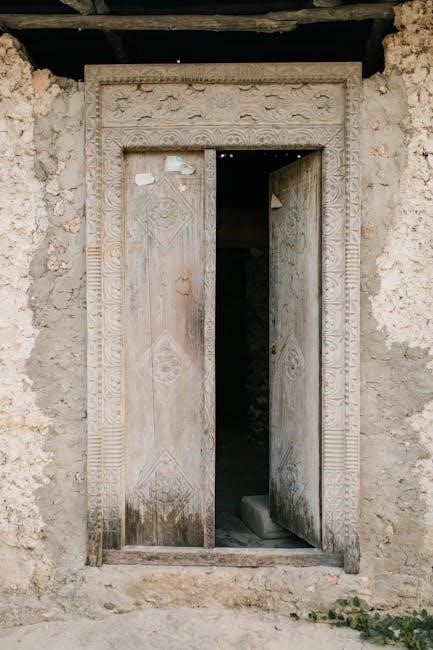The poem‚ written by John Agard‚ critiques traditional history education‚ emphasizing the erasure of Black history and culture. It explores identity through dialect and structure‚ inspiring reflection on how history is taught and perceived. A powerful commentary on cultural representation and education‚ it resonates deeply in academic settings‚ sparking discussions on diversity and inclusion in curriculum design.
1.1 Overview of the Poem and Its Significance
“Checking Out Me History” by John Agard is a powerful critique of Eurocentric education systems that often erase marginalized voices. The poem‚ published in his collection Half Caste‚ reflects on the speaker’s journey of reclaiming their cultural identity. It challenges the notion that history begins with colonial narratives‚ emphasizing the importance of recognizing diverse perspectives. Through its use of Caribbean dialect and alternating structures‚ the poem creates a vivid contrast between imposed histories and personal heritage. Its significance lies in its ability to spark dialogue about identity‚ education‚ and the representation of Black history‚ making it a vital tool for fostering inclusivity in learning environments.

1.2 Historical Context and Inspiration Behind the Poem
John Agard’s poem was inspired by his frustration with Eurocentric narratives dominating history education. The poem critiques the erasure of Black and Caribbean histories‚ reflecting Agard’s own experiences as a Caribbean immigrant in Britain. He draws from the marginalization of non-European cultures in educational systems‚ highlighting how such omissions distort identity and heritage. The poem was also influenced by Agard’s observation of how history textbooks often exclude or downplay the contributions of Black people‚ reducing their histories to colonial narratives. This historical oversight serves as the foundation for the poem’s powerful critique of traditional education and its impact on cultural identity.
Poem Structure and Style

The poem employs alternating structures‚ marked by different fonts‚ symbolizing the speaker’s journey through history. Dialect enriches the narrative‚ blending personal and cultural identity seamlessly.
2.1 Use of Dialect and Language in the Poem
The poem’s use of dialect and informal language creates a vivid‚ personal narrative voice. This choice reflects the speaker’s cultural identity and challenges traditional‚ formal historical narratives. By blending Caribbean dialect with standard English‚ Agard bridges gaps between personal and collective histories. The language also evokes a sense of authenticity‚ making the critique of historical erasure more relatable. The dialect serves as a powerful tool for reclaiming and celebrating overlooked voices‚ emphasizing the importance of diverse linguistic representations in education and literature. This linguistic duality enriches the poem’s emotional and thematic depth.
2.2 Alternating Structures and Their Symbolism

The poem employs alternating structures‚ marked by different fonts and line lengths‚ to symbolize the tension between imposed historical narratives and personal identity. The descending number of lines in sections may represent the gradual erosion of one’s true history. This structural duality mirrors the speaker’s journey from Eurocentric education to reclaiming their cultural roots. The alternation visually separates the dominant historical accounts from the marginalized voices‚ emphasizing the clash between what is taught and what is lived. This stylistic choice reinforces the theme of identity reconstruction‚ inviting readers to reflect on how history is presented and whose stories are prioritized.

Themes and Messages in the Poem
The poem critiques traditional history education for its Eurocentric bias and highlights the erasure of Black culture and identity‚ advocating for a more inclusive understanding of history.
3.1 Critique of Traditional History Education
The poem sharply critiques the Eurocentric bias in traditional history education‚ highlighting how it marginalizes Black and Caribbean experiences. Agard challenges the notion that history begins with Columbus‚ exposing the erasure of indigenous and African contributions. The speaker reflects on being “blinded” by textbooks that omit diverse narratives‚ suggesting a narrow‚ exclusionary approach to history; This critique underscores how such education perpetuates cultural invisibility and distorts identity. By questioning whose stories are valued‚ Agard advocates for a more inclusive understanding of history‚ urging readers to reclaim and celebrate their heritage. The poem thus serves as a powerful call for educational reform.

3.2 Identity‚ Culture‚ and Erasure
The poem vividly explores the erasure of Caribbean history and culture‚ reflecting the speaker’s journey to reclaim their identity. Agard highlights how Eurocentric narratives dominate‚ obscuring the richness of Black heritage. The speaker’s realization of being “blinded” by textbooks underscores the emotional toll of cultural omission. Through dialect and personal reflection‚ Agard connects with Caribbean roots‚ challenging the invisibility of marginalized voices. The poem emphasizes the importance of acknowledging and celebrating one’s cultural legacy‚ countering the erasure perpetuated by traditional education. It ultimately becomes a powerful assertion of identity‚ urging readers to embrace their history and resist its suppression. This theme resonates deeply with readers seeking empowerment through self-discovery and cultural pride.
Key Quotations and Their Analysis
The poem’s key lines highlight historical neglect and cultural identity‚ offering a powerful critique of Eurocentric narratives while celebrating Caribbean heritage through vivid imagery and personal reflection.
4.1 Lines Highlighting Historical Oversights
Specific lines in the poem‚ such as references to the exclusion of Black and Caribbean histories‚ emphasize the gaps in traditional education. The speaker critiques how history textbooks often begin with Columbus‚ ignoring the rich narratives of indigenous and African cultures. These lines underscore the erasure of marginalized voices‚ revealing how Eurocentric perspectives dominate historical accounts. Agard uses these omissions to challenge readers to question what is taught and what is omitted‚ urging a more inclusive understanding of the past. The poem’s structure mirrors this critique‚ with alternating fonts symbolizing the clash between official history and silenced narratives.
4.2 Quotes Emphasizing Cultural Identity
The poem powerfully emphasizes cultural identity through specific quotes that highlight the speaker’s connection to their Caribbean heritage. Lines such as “Dem tell me bout 1066 and all dat” critique the dominance of European history while erasing Black narratives. The speaker’s realization‚ “I blinded by dat history‚” underscores the alienation from one’s own culture. Another significant quote‚ “I checking out me history‚” reflects a reclaiming of identity and a rejection of Eurocentric perspectives. These lines illustrate the struggle to reconcile personal heritage with imposed historical narratives‚ emphasizing the importance of diverse representation in education and culture. The poem’s dialect further connects to Caribbean roots‚ celebrating linguistic diversity and cultural pride.

The Poet’s Background and Influence
John Agard‚ born in Guyana‚ moved to Britain in 1977‚ bringing multicultural perspectives to his work. His poem reflects his experiences and critique of cultural erasure‚ inspiring diverse voices in literature.
5.1 Biography of John Agard
John Agard‚ born in 1949 in Georgetown‚ Guyana‚ developed a passion for poetry early in life‚ influenced by the rich cultural tapestry of his homeland. He moved to Britain in 1977‚ where he became a prominent voice in Caribbean-British literature. Agard’s work often explores themes of identity‚ history‚ and cultural heritage‚ reflecting his dual Guyanese and British experiences. His poetry is celebrated for its accessibility and depth‚ blending humor with sharp social commentary. This unique blend has made him a beloved figure in workshops‚ schools‚ and literary festivals‚ inspiring diverse audiences to engage with poetry and their own histories.
5.2 How His Experiences Shaped the Poem
John Agard’s experiences as a Caribbean immigrant in Britain profoundly influenced “Checking Out Me History.” His observation of Eurocentric history education inspired the poem’s critique of traditional narratives. Agard’s dual identity shaped the poem’s exploration of cultural erasure and the reclaiming of heritage. Drawing from his own journey of navigating two cultures‚ he crafted verses that reflect the tension between imposed histories and personal identity. This duality is mirrored in the poem’s alternating structures‚ symbolizing the clash and harmony of conflicting cultural influences. Agard’s unique perspective transformed his experiences into a powerful commentary on identity‚ education‚ and the importance of diverse historical representation.

Reception and Impact of the Poem
“Checking Out Me History” has gained popularity in schools‚ sparking discussions on diverse histories. Its critique of traditional education resonates widely‚ inspiring curriculum reflection and change.
6.1 Popularity in Educational Settings
The poem is widely used in schools for its relevance to GCSE studies‚ particularly in exploring themes of identity and history. Its accessible language and critical perspective make it a favorite among educators. Teachers often use it to spark discussions on diversity‚ inclusion‚ and the importance of representation in education. The poem’s ability to connect with students’ experiences has made it a valuable resource for engaging young people in critical thinking about history and culture. Its popularity continues to grow as educators seek materials that reflect diverse voices and challenge traditional narratives.
6.2 Critical Response and Reviews
The poem has received critical acclaim for its bold critique of traditional history education. Reviewers praise its ability to challenge Eurocentric narratives and highlight the erasure of Black history. Educators frequently highlight its value in sparking discussions about diversity and inclusion. The poem’s use of dialect and alternating structures is often commended for its effectiveness in conveying the speaker’s emotional journey. Critics also note its accessibility‚ making it a powerful tool for engaging students in conversations about identity and cultural representation. Overall‚ the poem is celebrated for its thought-provoking themes and its impact on redefining how history is perceived and taught in educational settings.
Resources for Further Study
Download the PDF version of “Checking Out Me History” for in-depth analysis. Explore study guides‚ online discussions‚ and educational videos offering insights into the poem’s themes and structure.

7.1 PDF Versions and Study Guides
PDF versions of “Checking Out Me History” are widely available online‚ offering easy access to the poem and its analysis; Study guides provide detailed breakdowns‚ including historical context‚ themes‚ and literary devices. These resources are particularly useful for students studying the poem in educational settings‚ such as GCSE English. Many guides include line-by-line analysis‚ discussion questions‚ and essay prompts to deepen understanding. Websites like Scribd and educational forums host these materials‚ making them accessible for both individual and classroom use. These resources are invaluable for exploring Agard’s critique of history education and cultural identity‚ aiding in comprehensive lesson preparation.
7.2 Online Analysis and Educational Materials
Online platforms offer extensive analysis and educational materials for “Checking Out Me History”‚ providing deeper insights into its themes and structure. Websites like Scribd and educational forums host detailed line-by-line analyses‚ while YouTube channels and blogs explore the poem’s cultural significance. Teachers and students can access study guides‚ discussion prompts‚ and essay examples to aid comprehension. These resources often highlight Agard’s use of dialect and alternating structures‚ emphasizing their symbolic importance. Additionally‚ many educational websites provide historical context‚ connecting the poem to broader discussions on identity and education. These materials are invaluable for both classroom instruction and independent study‚ enriching the learning experience.



About the author